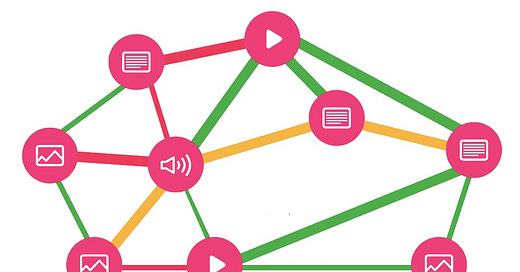The Beginnings of Bridgit DAO
How the notion of content bridges entered the collective consciousness
In the twilight of 2014-2015, the foundational thoughts of what would later mature into Bridgit DAO began to crystallize in my mind. At the heart of this nascent idea was a desire to nurture enduring conversations on the Internet about matters of substantial importance.
My observation at the time was stark: discussions on the web seemed ephemeral, dissolving within days, if not hours. Even Reddit, with its relatively structured approach to dialogue, had a policy of archiving threads after six months, a practice I found insufficient for fostering long-term intellectual engagement.
This led me to envision a platform where individuals, irrespective of their expertise level, could dive deep into any subject matter, exploring diverse perspectives, claims, evidence, and data sources. Importantly, this platform would intuitively guide users on where to post new, relevant information, ensuring participants were alerted to relevant updates.
My reflections during this period were also shaped by my experiences in the nonprofit and social enterprise sectors. Time and again, experts across various fields—be it water, food, peacebuilding, or energy—echoed a similar sentiment: the necessary information for informed decision-making was available; what was missing was a collective will to utilize this information effectively.
This recurring insight brought me to ponder the Trivium, an ancient learning framework comprising three parts: Grammar (knowledge), Logic (understanding), and Rhetoric (wisdom). This model suggests that wisdom, the ability to make sound decisions, is built upon a foundation of solid understanding, which in turn is based on comprehensive knowledge. The implication was clear: a restructured repository of global knowledge could be the key to unlocking greater collective understanding and, subsequently, wiser actions.
Confronted with the reality of our ever-increasing connectivity, facilitated by a burgeoning number of internet-connected devices, I was struck by the chaotic organization of information online. The Internet, as it stood, was a vast, unstructured maze of knowledge silos, fraught with misinformation, duplicative content, and SEO-driven materials, all contributing to a low signal-to-noise ratio. It dawned on me that there was a potential, albeit not guaranteed, path forward: by reorganizing information in a more coherent and interconnected manner, we might just catalyze a shift towards more informed collective consciousness and action.
Embracing the principle "live the story I want to tell," I was motivated by the prospect of contributing to a future where humanity, looking back from the vantage point of 2050, could proudly say we endeavored to reorganize our collective knowledge to ameliorate the Internet's flaws.
This conviction led me to narrow Bridgit's focus to the reorganization of the world's knowledge base, contemplating a model for the Internet that mirrors the complex, interconnected networks of the human brain. In these early days, conversations with my friend and colleague Z were pivotal, helping to refine the concept further. However, recognizing the challenges ahead and my commitments to another startup, I temporarily shelved the idea.
The true breakthrough came in 2017, during my work on provisional patents related to augmented reality books—a project separate from Bridgit. This work led to the conception of a social augmented reality book that not only connected readers with each other through discussions on book passages but also envisioned linking all books globally.
As I discussed these ideas with a patent specialist, the broader implications for Bridgit began to materialize. The realization that bridges defined in a meta layer above the webpage could connect disparate pieces of online information reinvigorated my commitment to the project. This was further reinforced by my introduction to blockchain technology at a retreat in British Columbia, which presented a feasible solution for implementing Bridgit's ambitious vision.
Despite a detour due to a failed crowdfunding campaign for the augmented reality book project—a setback that paradoxically freed up space for Bridgit to grow—momentum continued to build. A diverse and talented team began to coalesce around the project, each member bringing unique skills and perspectives that would shape Bridgit's development. From early brainstorming sessions to formal workshops and team-building efforts, every step forward was marked by a shared dedication to transforming how the world organizes and accesses information.
In essence, the journey to Bridgit has been a testament to the belief that a well-organized repository of knowledge can serve as the bedrock for deeper understanding and wiser collective action. Our mission goes beyond merely accumulating information; it aims to create a platform that facilitates meaningful connections between ideas, fostering a global dialogue that is both informed and enduring.





